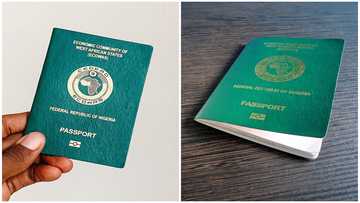Passport, Proof of Funds, 7 Other Must-have Documents to Secure Foreign Work Visa
- Obtaining a work visa for countries like Canada, the UK, Germany, Australia, or the UAE requires submitting several essential documents
- These include a valid passport, a job offer letter, language proficiency test results, a police clearance, a medical report, proof of funds, and others
- While requirements may differ by country, being organised and prepared with these core documents greatly improves your chances of securing a visa
Legit.ng journalist Victor Enengedi has over a decade's experience covering Energy, MSMEs, Technology, Banking and the Economy.
Thinking about launching your career overseas? Whether your sights are set on Canada, the United Kingdom, Germany, Australia, or the United Arab Emirates, obtaining a valid work visa is a crucial part of the process.

Source: UGC
While each country has its own specific requirements, there is a common set of documents that most immigration authorities expect from applicants.
Here’s a detailed look at the most frequently requested paperwork:
1. Valid passport
A valid passport is the cornerstone of your international application. Most countries require that your passport be valid for at least six months beyond your planned date of departure.
Some nations also insist on a certain number of blank pages for visa stamps. It’s wise to renew your passport early if it’s close to expiring or lacks space.
2. Official job offer letter
A job offer letter is usually non-negotiable when applying for a work visa. This letter should come directly from your prospective employer and must include specific information such as your job title, salary, start date, work location, and duration of employment.
In some cases, employers must be recognised or approved by the government, especially in regulated industries or sponsored visa programs.
3. Educational certificates
You’ll need to provide academic qualifications relevant to your job role. These may include your high school diploma, university degrees, or vocational training certificates.
Some immigration authorities require these documents to be certified, translated, or assessed through credential evaluation services to determine their equivalency in the destination country.
4. Proof of professional work experience
Demonstrating your previous work history is key to proving your suitability for the job. Accepted forms of evidence include:
- Reference letters on official company letterhead, signed by supervisors or HR.
- Copies of employment contracts outlining your roles and responsibilities.
- Recent payslips or tax returns showing your income and tenure.
- Some countries may ask for this documentation to cover a specific number of years in a relevant field.
5. Language proficiency test results
If you’re moving to a country where English or another language is the primary mode of communication, proof of language skills is essential. For English-speaking countries, recognised tests include:
- IELTS (International English Language Testing System)
- TOEFL (Test of English as a Foreign Language)
- PTE Academic (Pearson Test of English)
If you’re relocating to a non-English-speaking country like Germany or France, you may need proof of proficiency in their official language—typically through exams like TestDaF or DELF/DALF.
6. Police clearance certificate (PCC)
To confirm your good conduct and lack of a criminal record, you’ll often be required to submit a Police Clearance Certificate from your home country—or any other country where you’ve lived in recent years.
This document is issued by local law enforcement or national security agencies and may require fingerprinting and identity verification.
7. Medical certificate
Most work visas require proof that you’re in good physical and mental health. This typically involves undergoing a medical examination by a physician approved by the destination country’s immigration authority.
Tests may include chest X-rays, blood tests, and screenings for infectious diseases like tuberculosis or hepatitis. Some countries may also request vaccination records.
8. Proof of sufficient funds

Read also
Tilers, fashion designers: UK releases list of over 70 new occupations eligible for work visa
To ensure you won’t become a financial burden, immigration authorities often require evidence that you can support yourself while settling in. This might include:
- Recent bank statements
- Savings account summaries
- Letters of financial sponsorship
- Proof of prepaid accommodation or employment benefits
- Some countries set a minimum financial threshold based on the cost of living.
9. Professional Licenses or Accreditations
If you’re entering a profession that is regulated—such as medicine, teaching, law, or engineering—you’ll need to show proof of certification or registration with a recognised regulatory body in the destination country.
You may need to complete exams, submit additional documents, or undergo a competency assessment to meet local standards.

Source: Getty Images
Final note:
While visa requirements may vary slightly depending on the country and type of job, preparing these core documents thoroughly can streamline the application process and reduce the risk of delays.
It’s always wise to consult the official immigration website of your destination country or seek professional advice to ensure your application meets all current standards.
UK updates immigration policy
In related news, Legit.ng earlier reported that the British High Commission (BHC) introduced electronic visas for two groups of visa applications.
As per the update, Nigerians applying for study visas or work visas from July 15, 2025, will no longer be given a physical visa sticker (vignette) in their passports.
Successful applicants will, instead, get an electronic visa in line with the UK government’s plan to transition to a modern, digital immigration system.
Source: Legit.ng






